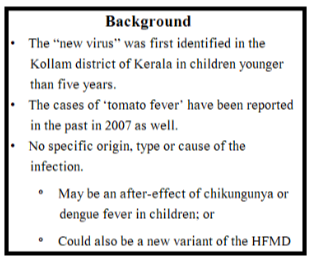The ‘tomato flu’ outbreak and the Centre’s advisory
- The Health Ministry recently issued an advisory asking States to take measures to prevent spread of the “new virus known as tomato flu”.
Tomato flu
- A probable variant of the hand, foot and mouth disease, or HFMD.
- Commonly occurs in children under 10 years of age and can also infect adults.
- India recorded around 100 cases of ‘tomato flu’ in children below 9 years of age in less than three months.
- A “highly contagious” yet “non-life-threatening viral” disease.

Features
- Named so because of the “eruption of red and painful blisters throughout the body that gradually enlarge to the size of a tomato.”
- A mild viral illness commonly affecting young children typically below age 10.
- Usually caused by a Coxsackie virus.
Advisory
- The virus is not related to SARS-CoV-2, monkeypox, dengue, or chikungunya despite similar symptoms.
- The disease is a clinical variant of the hand, foot and mouth disease (HFMD) common in school-going children.
- Infants and young children are also prone to this infection through the use of nappies, touching unclean surfaces as well as putting things directly into the mouth.
- It is a self-limiting illness and no specific medication exists for its treatment yet.
Symptoms
- Fever, rashes and pain in joints.
- Illness usually begins with a mild fever, poor appetite, malaise, and occasionally, a sore throat.
- Small red blisters appear one or two days after the fever
- Usually located on the tongue, gums, inside of the cheeks, palms and soles.
- Sometimes, fatigue, nausea, vomiting, diarrhoea, dehydration, swelling of joints, body ache, and common influenza-like symptoms are noted.
Treatment and Precautions
- Isolation for 5-7 days from the onset of any symptom
- Supportive therapy of paracetamol for fever and body ache
- Other symptomatic treatments
- A nutrition-rich, balanced diet to boost immunity
- Rest, plenty of fluids
- A hot water sponge to provide relief from irritation and rashes etc.
